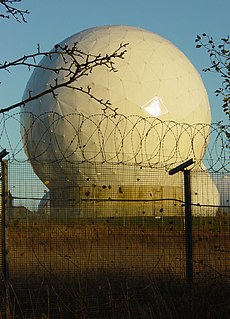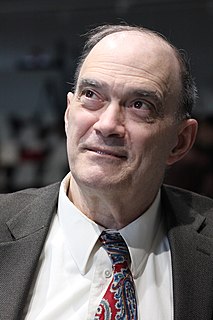
ECHELON, originally a secret government code name, is a surveillance program operated by the United States with the aid of four other signatory states to the UKUSA Security Agreement: Australia, Canada, New Zealand, and the United Kingdom, also known as the Five Eyes.

The United States Foreign Intelligence Surveillance Court is a U.S. federal court established under the Foreign Intelligence Surveillance Act of 1978 (FISA) to oversee requests for surveillance warrants against foreign spies inside the United States by federal law enforcement and intelligence agencies. Such requests are made most often by the National Security Agency (NSA) and the Federal Bureau of Investigation (FBI). Congress created FISA and its court as a result of the recommendations by the U.S. Senate's Church Committee.

The National Security Agency (NSA) is a national-level intelligence agency of the United States Department of Defense, under the authority of the Director of National Intelligence (DNI). The NSA is responsible for global monitoring, collection, and processing of information and data for foreign and domestic intelligence and counterintelligence purposes, specializing in a discipline known as signals intelligence (SIGINT). The NSA is also tasked with the protection of U.S. communications networks and information systems. The NSA relies on a variety of measures to accomplish its mission, the majority of which are clandestine. The existence of the NSA was not revealed until 1975. The NSA has roughly 32,000 employees.

The United Kingdom – United States of America Agreement is a multilateral agreement for cooperation in signals intelligence between Australia, Canada, New Zealand, the United Kingdom, and the United States. The alliance of intelligence operations is also known as the Five Eyes. In classification markings this is abbreviated as FVEY, with the individual countries being abbreviated as AUS, CAN, NZL, GBR, and USA, respectively.

Project MINARET was a domestic espionage project operated by the National Security Agency (NSA), which, after intercepting electronic communications that contained the names of predesignated US citizens, passed them to other government law enforcement and intelligence organizations. Intercepted messages were disseminated to the FBI, CIA, Secret Service, Bureau of Narcotics and Dangerous Drugs (BNDD), and the Department of Defense. The project was a sister project to Project SHAMROCK.
Project SHAMROCK was the sister project to Project MINARET, an espionage exercise started in August 1945. Project MINARET involved the accumulation of all telegraphic data that entered or exited the United States. The Armed Forces Security Agency (AFSA) and its successor, the National Security Agency (NSA), were given direct access to daily microfilm copies of all incoming, outgoing, and transiting telegrams via the Western Union and its associates RCA and ITT. NSA did the operational interception, and, if there was information that would be of interest to other intelligence agencies, the material was passed to them. Intercepted messages were disseminated to the FBI, CIA, Secret Service, Bureau of Narcotics and Dangerous Drugs (BNDD), and the Department of Defense. No court authorized the operation and there were no warrants.

NSA warrantless surveillance — also commonly referred to as "warrantless-wiretapping" or "-wiretaps" — refers to the surveillance of persons within the United States, including U.S. citizens, during the collection of notionally foreign intelligence by the National Security Agency (NSA) as part of the Terrorist Surveillance Program. In late 2001, the NSA was authorized to monitor, without obtaining a FISA warrant, the phone calls, Internet activity, text messages and other communication involving any party believed by the NSA to be outside the U.S., even if the other end of the communication lay within the U.S.

Russell D. Tice is a former intelligence analyst for the United States Air Force, Office of Naval Intelligence, Defense Intelligence Agency (DIA), and National Security Agency (NSA).

The Terrorist Surveillance Program was an electronic surveillance program implemented by the National Security Agency (NSA) of the United States in the wake of the September 11, 2001 attacks. "The program, which enabled the United States to secretly track billions of phone calls made by millions of U.S. citizens over a period of decades, was a blueprint for the NSA surveillance that would come after it, with similarities too close to be coincidental". It was part of the President's Surveillance Program, which was in turn conducted under the overall umbrella of the War on Terrorism. The NSA, a signals intelligence agency, implemented the program to intercept al Qaeda communications overseas where at least one party is not a U.S. person. In 2005, The New York Times disclosed that technical glitches resulted in some of the intercepts including communications which were "purely domestic" in nature, igniting the NSA warrantless surveillance controversy. Later works, such as James Bamford's The Shadow Factory, described how the nature of the domestic surveillance was much, much more widespread than initially disclosed. In a 2011 New Yorker article, former NSA employee Bill Binney said that his colleagues told him that the NSA had begun storing billing and phone records from "everyone in the country."

The Five Eyes (FVEY) is an intelligence alliance comprising Australia, Canada, New Zealand, the United Kingdom, and the United States. These countries are parties to the multilateral UKUSA Agreement, a treaty for joint cooperation in signals intelligence.
Warrantless searches are searches and seizures conducted without court-issued search warrants.
Signals intelligence by alliances, nations and industries comprises signals intelligence (SIGINT) gathering activities by national and non-national entities; these entities are commonly responsible for communications security (COMSEC) as well.

William Edward Binney is a former intelligence official with the United States National Security Agency (NSA) and whistleblower. He retired on October 31, 2001, after more than 30 years with the agency.

PRISM is a code name for a program under which the United States National Security Agency (NSA) collects internet communications from various U.S. internet companies. The program is also known by the SIGAD US-984XN. PRISM collects stored internet communications based on demands made to internet companies such as Google LLC under Section 702 of the FISA Amendments Act of 2008 to turn over any data that match court-approved search terms. Among other things, the NSA can use these PRISM requests to target communications that were encrypted when they traveled across the internet backbone, to focus on stored data that telecommunication filtering systems discarded earlier, and to get data that is easier to handle.

The practice of mass surveillance in the United States dates back to wartime monitoring and censorship of international communications from, to, or which passed through the United States. After the First and Second World Wars, mass surveillance continued throughout the Cold War period, via programs such as the Black Chamber and Project SHAMROCK. The formation and growth of federal law-enforcement and intelligence agencies such as the FBI, CIA, and NSA institutionalized surveillance used to also silence political dissent, as evidenced by COINTELPRO projects which targeted various organizations and individuals. During the Civil Rights Movement era, many individuals put under surveillance orders were first labelled as integrationists, then deemed subversive, and sometimes suspected to be supportive of the communist model of the United States' rival at the time, the Soviet Union. Other targeted individuals and groups included Native American activists, African American and Chicano liberation movement activists, and anti-war protesters.

Ongoing news reports in the international media have revealed operational details about the Anglophone cryptographic agencies' global surveillance of both foreign and domestic nationals. The reports mostly emanate from a cache of top secret documents leaked by ex-NSA contractor Edward Snowden, which he obtained whilst working for Booz Allen Hamilton, one of the largest contractors for defense and intelligence in the United States. In addition to a trove of U.S. federal documents, Snowden's cache reportedly contains thousands of Australian, British, Canadian and New Zealand intelligence files that he had accessed via the exclusive "Five Eyes" network. In June 2013, the first of Snowden's documents were published simultaneously by The Washington Post and The Guardian, attracting considerable public attention. The disclosure continued throughout 2013, and a small portion of the estimated full cache of documents was later published by other media outlets worldwide, most notably The New York Times, the Canadian Broadcasting Corporation, the Australian Broadcasting Corporation, Der Spiegel (Germany), O Globo (Brazil), Le Monde (France), L'espresso (Italy), NRC Handelsblad, Dagbladet (Norway), El País (Spain), and Sveriges Television (Sweden).

The origins of global surveillance can be traced back to the late 1940s, when the UKUSA Agreement was jointly enacted by the United Kingdom and the United States, whose close cooperation eventually culminated in the creation of the global surveillance network, code-named "ECHELON", in 1971.

Global mass surveillance can be defined as the mass surveillance of entire populations across national borders.

Global surveillance refers to the practice of globalized mass surveillance on entire populations across national borders. Although its existence was first revealed in the 1970s and led legislators to attempt to curb domestic spying by the National Security Agency (NSA), it did not receive sustained public attention until the existence of ECHELON was revealed in the 1980s and confirmed in the 1990s. In 2013 it gained substantial worldwide media attention due to the global surveillance disclosure by Edward Snowden.

Global surveillance whistleblowers are whistleblowers who provided public knowledge of global surveillance.










